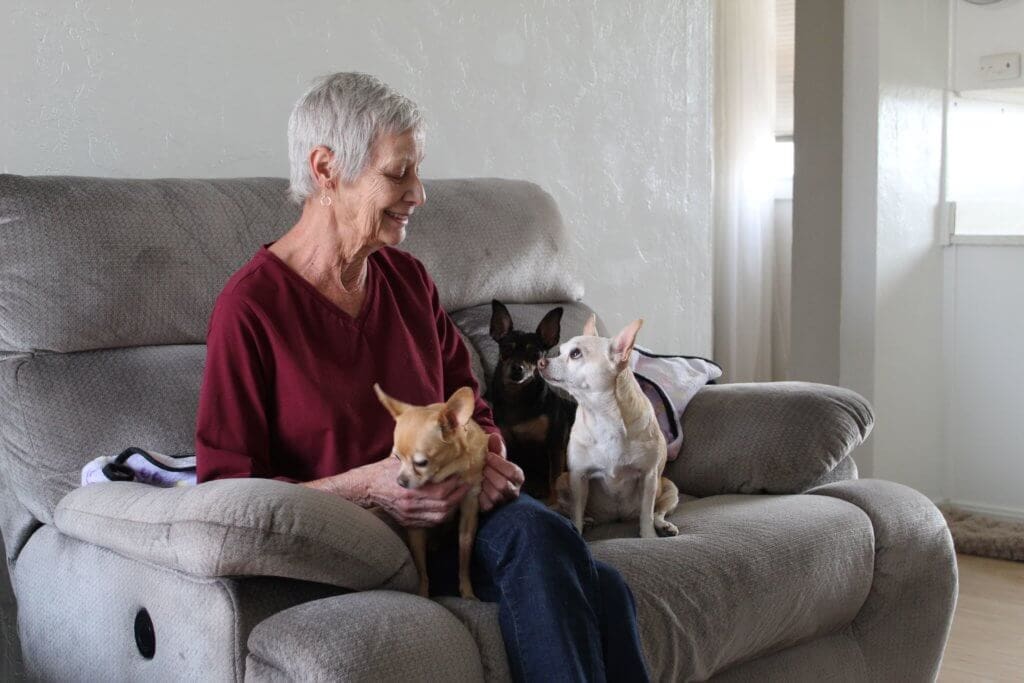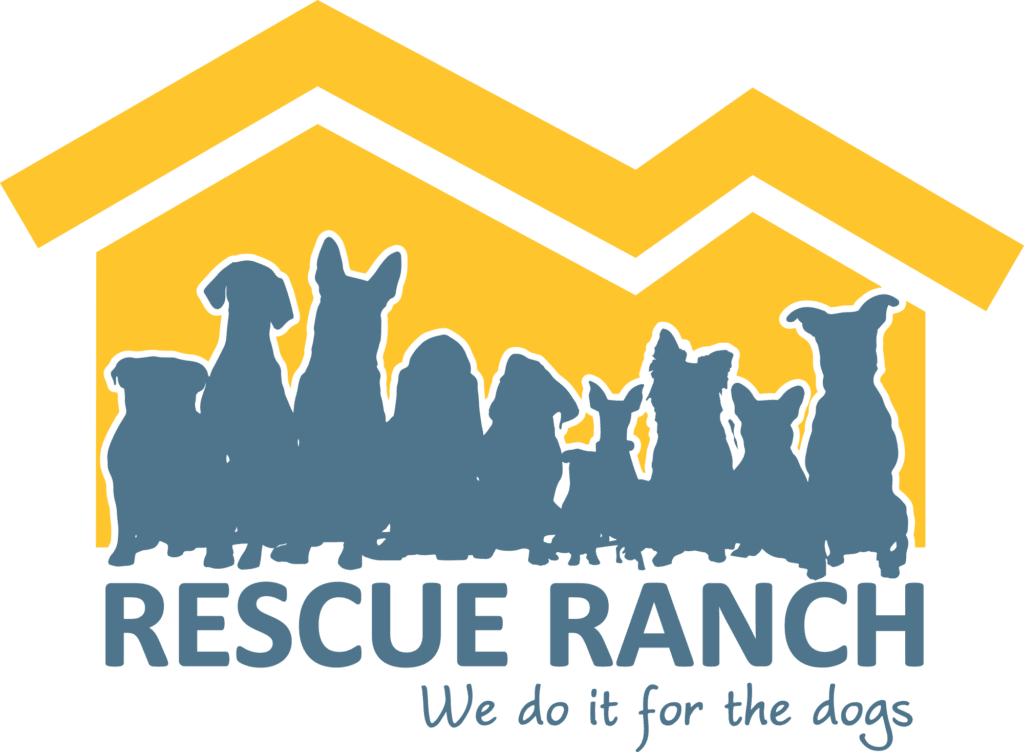If I were to ask you, what is Rescue Ranch and where is it? You would probably say it is a no-kill dog rescue with an adoption center, a boarding facility, and a thrift store, in Yreka, California. Your answer might also include our new Sanctuary and training facility out in the Big Springs area near Mount Shasta. You could add that, on average, we have roughly 50 dogs in our care on any given day: 35 to 40 dogs in Yreka, and a mix of 12 dogs and puppies at the Sanctuary, which is still in its infancy. That would be a good answer but an incomplete one.
What you might not know, is that Rescue Ranch is also a network of devoted fosters who help with puppies, mothers, and other special cases. When you add up all the foster dogs, the total number of animals Rescue Ranch is responsible for nearly doubles! So, as you can see, although they are not public facing, fosters are an essential part of the Rescue Ranch operation. And remember, they are all volunteers.
If you’ve been following us on social media, you’ve gotten to know our puppy fosters through their posts and videos. You’re also aware that they almost always have a number of cute puppies that will soon be looking for forever homes. You’re probably less familiar with our other fosters, like Linda Kusaka, who devotes her time to small senior and special needs rescue dogs.

I caught up with Linda this week to talk about how she got into fostering and why she chose senior dogs.
Linda currently has nine dogs: Rambo, Jojo, Poppy, Bambi, Grandpa, and Chloe are all Chihuahuas or Chihuahua mixes; Daisy is an affectionate bichon who loves the camera, Rayder is a cute muppet-like shih tzu mix, and Chia is a blind and nearly completely deaf Yorkie/Cairn mix. All are lovingly cared for in her home.
Her yard is fenced with small dogs in mind. According to Linda, this requires close attention because “littles” find ways to squeeze through or get stuck in the smallest of openings. Inside, at the back, there is a dog room, complete with crates and a grooming station. The dogs happily eat in their meals in their crates, which avoids scuffles over food
After retiring, Linda chose to volunteer as a full-time Rescue Ranch dog foster
I asked Linda if she had always had dogs and why she became a foster.
“Well, the way I started out was probably when I was in 5th or 6th grade in Vallejo, California. They decided to tear down the old town and when they started kicking people out of their houses, kids started bringing their pets to me. You know, like cats, because people didn’t have a home, so the animals didn’t have a home. So, I ended up taking cats and dogs in and trying to find homes for them.
My dad was a bartender at Golden Bubble, it was a very nice restaurant, and he would take the stray cats over there because they got plenty of food every day. And so that’s how it started.”
Linda went on to say that he used to have her own successful business designing and making jewelry. When she retired, she still wanted to do something meaningful with her time. Given her life-long love of animals, it seemed that fostering was a logical choice. So, in October of 2015, she attended a meeting to learn more about it. The rest, as she says, is history.
Linda didn’t start off with seniors, she just wanted to foster small dogs. Then, one day, she took in two Chihuahuas that had been found abandoned on route A12. One of them was having seizures. In the process of caring for her, Linda learned more about special needs dogs, which led her to seniors. Senior rescues often have special needs.
Grandpa was her first deliberate senior foster. He came in with a heart murmur, serious dental problems, and a hole in the roof of his mouth caused by a tooth. He was in a lot of pain, and his discomfort was manifest. The vet did and full dental and stitched up the hole, which left him feeling a whole lot better. Grandpa has been with Linda ever since. She describes him as somewhat senile now. He’s a great little dog that just gets a bit confused sometimes.
Chia is Linda’s most extreme special needs case. The Yorkie/cairn mix is elderly, blind, mostly deaf. She also has knee issues and very bad hip dysplasia. At first, the poor girl could hardly get around at all, even in her “full support” wheelchair. But, with CBD oil, Chia is now able to move around on her wheels and exercise her muscles much more than she used to.
Linda gravitated towards seniors and medical cases because they need love and care. People just dump them at the shelters because they don’t want to deal with the issues that come with age. Thankfully, Linda believes, as we do, that older dogs deserve so much better .
Accepting the senior and special needs rescue dog foster challenge is highly rewarding and totally worth the effort
I asked if she felt that fostering was worth it. After all, it must be difficult to build a relationship with a dog and then have to let it go. She replied that, yes, absolutely, it was worth it.
“If you’re a family and you foster a younger dog. It gives your family a good idea of what it takes to take care of a dog. That’s a good way to see if you’re ready. If your children are ready.
She added that in some cases fostering to adopt is a good thing.
“You know, [especially] if you’re looking for an older dog, seniors are very set in their ways, you’re not going to change them. You’re going to have to go along with what they are. Of course, they can learn to go potty in the right place, but I’m talking about their personality.”
She agreed that, as a foster, she had to be ready to give up the dog. But, with senior and special needs rescue dogs, Linda realized that she also had to be ready for the opposite outcome. She had to be in it for the long haul if necessary.
“I knew that would happen if I started doing the medical [cases]. The problem is you might end up with them for a very long time or for the rest of their life. If you do regular fostering, its nothing like that. But, yes … You have to be willing to love that dog, bring it along the right road, and give it up.”
She conceded that “foster fails” are always a possibility and admitted to five of her own. Daisy came to Linda as a foster but is now officially adopted. Jojo was a rescued pregnant stray, who was adopted out three times, before Linda decided to keep her. Poppy was found in a dumpster and is now living the life of Riley in his forever home with Linda. Bambi is a friendly puppy mill dog who likes treats and barking. Rambo was Linda’s first foster and first foster fail. He wasn’t a senior in 2015, but he is now.
Chia and Grandpa are examples of long-term hospice-type fostering: Rescue Ranch is responsible for their medical needs, but they live with Linda permanently.
While it can be hard to say goodbye, Linda says that she really loves finding good matches for her dogs. She looks for “senior for senior” matches because older dogs do better in quieter, undemanding environments, while senior adopters appreciate their company and lower energy.
Currently Linda has two fosters who will will soon be up for adoption. Chloe the Chihuahua, is a tripod front leg amputee. At seven years old she is barely a senior, and Rayder, the little shih tzu mix, is also around seven years old. He is blind in one eye and has clearly suffered some emotional trauma that he will need help with.
Despite its challenges, Linda said she highly recommended fostering, and that it was incredibly rewarding. She added that it was not necessary to do it full-time to make a difference. “For me, it’s my life, [but for] other people it’s not going to be their life, it’ll be a part of their life.”
We always need more help at Rescue Ranch, including fosters for both large and small senior and special needs rescue dogs. If you are interested in learning more about fostering, please call us at (530) 842-0829, or better yet come by and get to know us, we are open to the public seven days a week from 12 to 4 p.m.
“Fostering, to me it’s the most satisfying thing I could ever do because animals have given me so much. Especially the dogs. Without dogs, I probably wouldn’t even be alive right now. Really. They’ve always been my best friends. And they’re just … I don’t know how to explain the feeling of the company of animals.” – Linda Kusaka
























